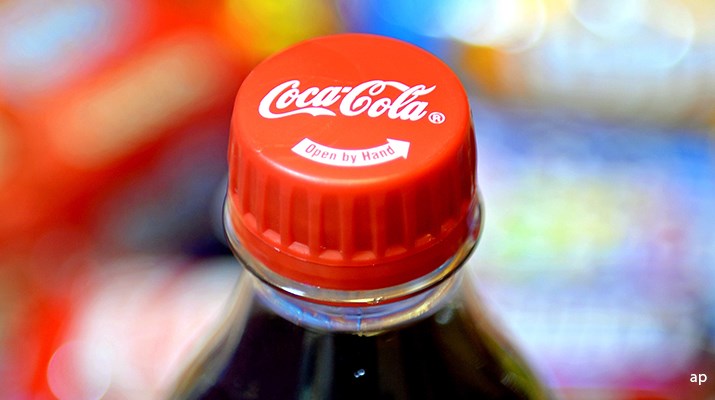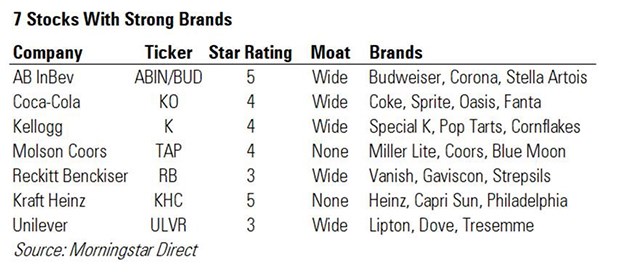
The coronavirus lockdown is changing our habits. We’re cooking and cleaning more, grooming less, and indulging in comfort foods from our favourite brands. With eating and drinking at bars and restaurants off the menu, consumers are treating themselves to little luxuries at home instead.
With this shift in mind, we're looking for consumer stocks with solid brands that are undervalued by Morningstar measures. Of course, which consumer trends will persist post-pandemic is up for debate, but these companies have the brand strength to endure no matter where consumer tastes go next.
Here, we consider the outlook for some of these undervalued businesses with strong brands:

Anheuser-Busch InBev (ABIN/BUD)
Morningstar analysts recently reduced the Fair Value Estimate on AB InBev, taking into account the expected effect of the Covid-19 crisis on short-term results. But the pandemic will have little long-term impact on the business, according to Morningstar analyst Philip Gorham, who says the stock is "egregiously undervalued", given its wide Morningstar Economic Moat Rating and significant cost advantages.
Vast global scale and near-monopoly dominance in several Latin American and African markets gives AB InBev cost advantages and pricing power. This is particularly true following its acquisition of SABMiller in 2016. Gorham says: “AB InBev has been acquisitive, having made transformative deals for Interbrew and Anheuser-Busch, and more recently acquiring Grupo Model, Oriental Brewery, and SABMiller. Management’s playbook is to buy brands with a promising growth platform, expand distribution and ruthlessly squeeze costs from the business.”
Unilever PLC (ULVR)
The pandemic knocked down volumes off the maker of Knorr soups, Lipton teas, and Dove skin products (among dozens of other brands) last quarter, leading analysts to slightly reduce the fair value estimate of Unilever. But Gorham says his long-term assumptions haven’t changed and the high-quality firm can defend its shelf space.
After initially struggling to adapt to an environment where niche, local and artisanal brands are en vogue, Unilever’s management is taking the right steps to reignite growth in some highly competitive categories. There are challenges, however, and Unilever’s strategy of giving more product development autonomy to regional management means the company had lost its focus on scalable innovation. Gorham says: “This is not a problem that will be easily solved and it will require high levels of customer acquisition spending, financed through cost savings from elsewhere.”
He adds: “With a wide economic moat, built around its supply chain advantages, Unilever has a better chance that most of its peer group of reigniting growth in the medium-term, in our opinion, but remains in categories with relatively weak pricing growth drivers.”
Coca-Cola (KO)
Wide-moat Coca-Cola’s April earnings report was set up to be a fraught one, with the stock’s weakness in the lead-up attributable not only to the broader market sell-off but also a rare retraction of full-year guidance. Despite solid first-quarter results, its commentary seemed to portend a pretty ugly second quarter.
But Morningstar analysts remain confident in Coca-Cola’s strategic advantages and its ability to navigate the disparate regions across which it trades. The coronavirus pandemic has ravaged virtually all the firm’s markets. Even in Asia, while countries like China have slowly started to normalise, there have been fits and starts in other important markets like Japan. With social distancing mandates being enforced almost everywhere, the worst is likely yet to come.
But analysts expect a steady, albeit non-linear, rebound during the second half of the year, but acknowledge the impact of the pandemic will meaningful affect the top line in 2020. Uncertainty abounds in the near term, says Morningstar analyst Nicholas Johnson. But the stock’s $54 fair value estimate is intact, and shares appear to offer compelling value at current levels.
Kraft Heinz (KHC)
Kraft Heinz may be a no-moat stock, but it is a winner with consumers amid the Covid-19 crisis; the firm posted organic sales growth of 6% in the first quarter of the year. Yet Morningstar analyst Erin Lash is concerned that the current growth is not sustainable: “We aren’t surprised its fare is winning with consumers amid mandated shelter-in-place orders and social distancing initiatives. However, we don’t think this growth will prove sustainable, as consumers ultimately destock their pantries.” She also points out that the intensely competitive environment in which the firm operates remains a challenge that is not poised to fade.
Kraft Heinz has seen lacklustre sales and impaired retail relationships since the merger of the two food giants in 2015 but Lash thinks the firm’s new chief executive, Miguel Patricio, will pursue a strategy of sustainable efficiencies rather than blindly cutting costs, and could up the ante on spending in marketing and product innovation. She adds: “Although we view this aim as prudent, we think sales will revert back to the low-single-digit marks that tend to emulate from this mature industry.”
A version of this article first appeared on Morningstar US









.jpg)



















